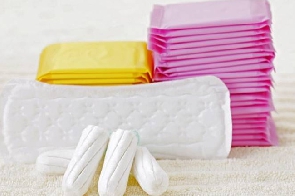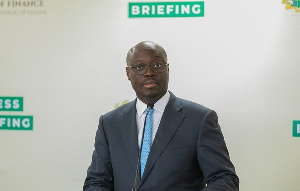The Ghana CSOs Platform on the Sustainable Development Goals (SDGs) has appealed to the government to help make sanitary products affordable to all women and girls.
Sanitary products are currently enlisted on the chapter 96 of the Harmonised System,
and that attracts a 32.5 percent tax on imported sanitary pads, which is made up of 20 % import duty and 12.5 % in Value Added Tax.
The Platform urgently calls on the Ministry of Finance and the government to, as a matter of urgency, to scrap the import tax on sanitary pads and reclassify the product as ‘essential social goods’ which is Zero (0) rated.
The Platform reminds the government that African countries such as Kenya, Rwanda, and South Africa have removed taxes on sanitary products and so can Ghana. This is contained in a press release to commemorate the 2023 Menstrual Hygiene Day which falls on Sunday 28th May 2023, and is themed, “Making menstruation a normal fact of life by 2030.”
The Platform notes that, “women's and adolescent girls’ ability to care for their bodies while menstruating is an essential part of this fundamental human right. Poor menstrual health and hygiene therefore represent an affront to this right, including the right to work and go to school.
Insufficient resources to manage menstruation, such as sanitary pads and clean water, worsen the already existing social and economic inequalities. It further undermines human dignity and attacks the confidence of girls and women”. The platform is therefore calling for a comprehensive effort aimed at making sanitary products affordable and intensifying public education on menstruation.
The Platform appeals to Ghanaian schools, workplaces, and public institutions to ensure that people can manage menstruation with comfort and dignity while being productive. It notes that, “our aim is to contribute to the building of a fairer, healthier, gender-responsive Ghana that acknowledges and works towards achieving the vision for sanitation and hygiene under Goal 6 of the Sustainable Development Goals: “By 2030, achieve access to adequate and equitable sanitation and hygiene for all, paying special attention to the needs of women and girls and those in vulnerable situations”.
The Platform calls on the government to increase political priority and ignite action for menstrual health and hygiene so that women and girls feel confident, comfortable, and free of any shame. Policies that eliminate period poverty, especially for low-income women and girls who struggle to afford menstrual products and have limited access to water and sanitation services, must be expedited.
To the Ghanaian media, let us encourage open dialogue on menstruation. It is a great way to break period stigma and teach young girls on how to stay healthy and hygienic during menstruation.
Health News of Sunday, 28 May 2023
Source: Ghana CSOs Platform













